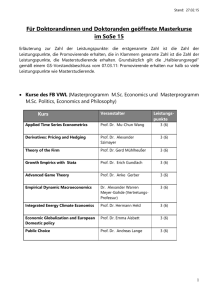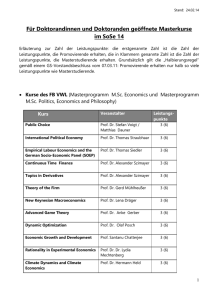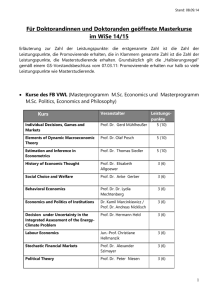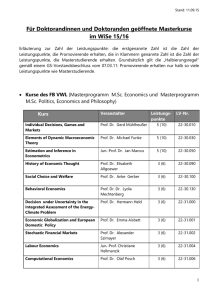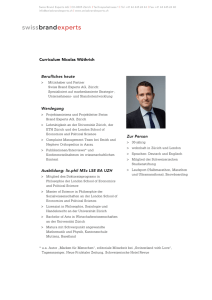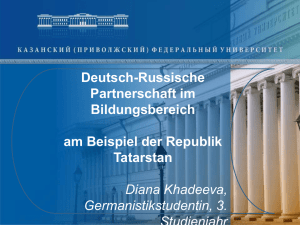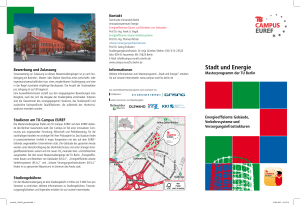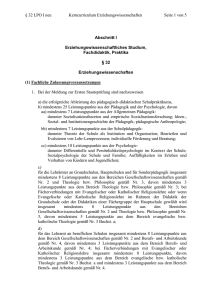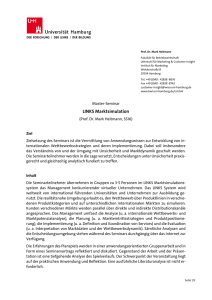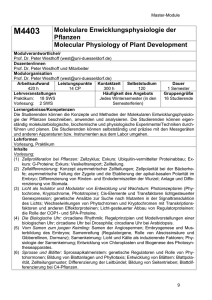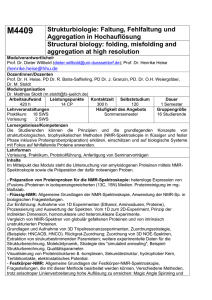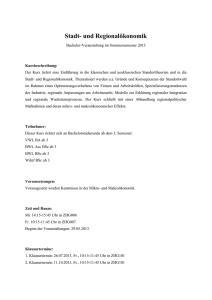Sommersemester 2013
Werbung
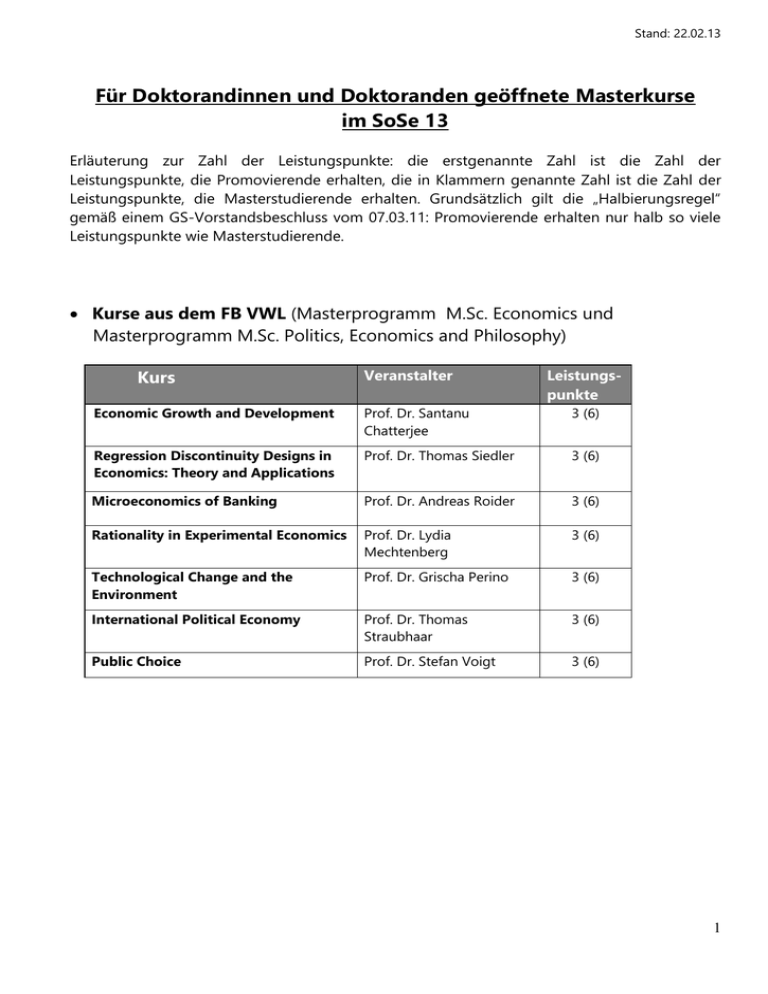
Stand: 22.02.13 Für Doktorandinnen und Doktoranden geöffnete Masterkurse im SoSe 13 Erläuterung zur Zahl der Leistungspunkte: die erstgenannte Zahl ist die Zahl der Leistungspunkte, die Promovierende erhalten, die in Klammern genannte Zahl ist die Zahl der Leistungspunkte, die Masterstudierende erhalten. Grundsätzlich gilt die „Halbierungsregel“ gemäß einem GS-Vorstandsbeschluss vom 07.03.11: Promovierende erhalten nur halb so viele Leistungspunkte wie Masterstudierende. Kurse aus dem FB VWL (Masterprogramm M.Sc. Economics und Masterprogramm M.Sc. Politics, Economics and Philosophy) Kurs Veranstalter Leistungspunkte Economic Growth and Development Prof. Dr. Santanu Chatterjee 3 (6) Regression Discontinuity Designs in Economics: Theory and Applications Prof. Dr. Thomas Siedler 3 (6) Microeconomics of Banking Prof. Dr. Andreas Roider 3 (6) Rationality in Experimental Economics Prof. Dr. Lydia Mechtenberg 3 (6) Technological Change and the Environment Prof. Dr. Grischa Perino 3 (6) International Political Economy Prof. Dr. Thomas Straubhaar 3 (6) Public Choice Prof. Dr. Stefan Voigt 3 (6) 1 Kurse aus dem FB Sozialwissenschaften (Masterprogramm M.A. Politik- wissenschaft, Masterprogramm M.A. Soziologie, Masterprogramm M.A. Internationale Kriminologie) Kurs Veranstalter Leistungspunkte Die politische Rolle des Supreme Court Prof. Dr. Christine Landfried 5 (10) Lateinamerika in der internationalen Politik: Regionalmächte, Regionalorganisationen und strategische Partner Prof. Dr. Detlef Nolte 5 (10) Legitimitätsfragen des Völkerrechts Prof. Dr. Peter Niesen 5 (10) Foreign Policy Analysis: Theories and Practices of Foreign Policy Making in the US and Germany Prof. Dr. Hartmut Meyer 5 (10) The Cold War Revisited: The Current World Order in its Historical Context Prof. Dr. Hartmut Meyer 5 (10) Politische Theorie der Mensch-TierBeziehung Prof. Dr. Peter Niesen 5 (10) Rechtsprechung und Politik PD Dr. Ingrid Schneider 5 (10) The United Nations as an Actor for Peace and Security Prof. Dr. Michael Brzoska 5 (10) Michel de Certeaus ‚Die Kunst des Handelns‘: Von Taktiken des Alltags zu Politiken der Unsichtbarkeit Prof. Dr. Urs Stäheli 3 (5) Organisationssoziologie: Managementkontrolle Prof. Dr. Jürgen Beyer 3 (5) Volatile Bodies – theoretische Konzepte zum Körper Prof. Dr. Marianne Pieper 3 (5) Cultural Studies und qualitative Methoden Prof. Dr. Alexander Geimer 3 (5) Analyzing Survey Data Prof. Dr. Sonja Drobnic 3 (5) Geschlechter-Arrangements und Geschlechterkultur im internationalen Vergleich – Theorie und empirische Forschung Prof. Dr. Birgit PfauEffinger 3 (5) Sozialwissenschaftliche Klimaforschung Prof. Dr. Anita Engels 3 (5) 2 Kurse aus dem FB Sozialökonomie (Masterprogramm M.A. Ökonomische und Soziologische Studien, Masterprogramm M.A. Europastudien und Masterprogramm M.A. International Business Administration) Kurs Veranstalter Leistungspunkte European Monetary Integration Prof. Dr. Ingrid Größl 2 (4) European Political Economy II Prof. Dr. Stefan Collignon 2 (4) Political Economy of Liberty Prof. Dr. Stefan Collignon 2 (4) Monetary Policy and Monetary Institutions Prof. Dr. Stefan Collignon 2 (4) International Economics Prof. Dr. Emma Aisbett 2 (4) Globalization, Development, Poverty and Inequality Prof. Dr. Emma Aisbett 2 (4) International Contract Law PD Dr. Karsten Nowrot 2 (4) International Economic Law PD Dr. Karsten Nowrot 2 (4) Arbeitsmarkt und soziale Ungleichheit aus der Genderperspektive Prof. Dr. Anne Busch 2 (4) Arbeit im Umbruch Prof. Dr. Nicole MayerAhuja 2 (4) Arbeitsökonomische Analysen Prof. Dr. Aysel Yollu-Tok 2 (4) Experimentelle Wirtschaftsforschung Prof. Dr. Ralf Steinhauser 2 (4) WiSo-Graduate School, 22.02.13 3
